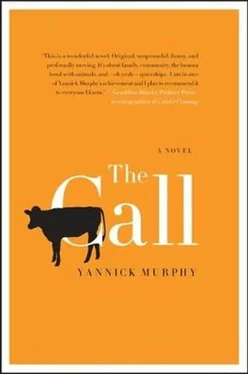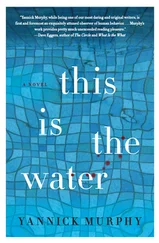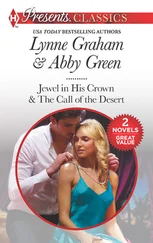At the end of the visit, the doctor scratches his head. I’m miffed, he says. I’ve found nothing unusual once again, but your levels, still considered high, are slightly lower. He looks sad, and I want to tell him something funny to cheer him up. I wonder if the zebra story would do it. Is the zebra story a rib-tickler to others? I wonder. I don’t tell the doctor a story before I leave. Instead I tell the doctor how much I appreciate him taking the time to see me. I shake his hand, and he holds on to it for a while and I think he wants to take a look at my hand, too. Maybe he wants to palpate it as well. He wants to find a lump on me somewhere, on my palms, on the bit of skin between my thumb and forefinger that looks like a bat’s wing. I promise him I’ll come back in six months, for more tests and more exams. You never know, I say. My levels might mean something after all. He looks happier after I say it. Yes, I look forward to seeing you then, he says.
WHAT THE WIFE SAYS AFTER HER VISIT WITH HER DOCTOR THE SAME DAY:Hallelujah. There was nothing out of the ordinary about my exams, either. My breasts are perfect, but you already knew that, she says, laughing. We drive home on the winding road from the hospital back to our town. It is coming on maple syrup season. The days are warmer, but the nights still cold. On their land, most people have tapped the maples and the metal buckets that hang from taps hammered into the trunks look strange, as if the ceiling of the sky were leaking and the buckets were set out to collect the rainwater.
CALL:A one-and-a-half-year-old shire has a respiratory infection.
ACTION:I drive to the farm, taking my wife along with me while the kids are at school, and even Sam’s back in classes. We drive on the dirt roads thinking how our dirt roads are prettier. Our dirt roads are more like lanes than roads, the narrowness of them making our roads seem quaint. We drive talking about our children. When we are alone we like to tell each other how wonderful our children are, but it is something we do not tell others. We tell each other with abandon, things we have lately seen in our children that prove how smart and wonderful and cute they are. We puff each other up with the glory of our children, we talk about how beautifully Sam is recovering, his speech not half as slurred, as if this were a sign of some sort of intelligence, but the minute we pull in to the farm, our conversation changes and we both know that it will be a while again before we are alone, without being interrupted, for a long period of time where we can brag so shamelessly to one another. It is a relief to do all the bragging, it’s cathartic, as if we need every once in a while to do this bragging, or so that we remind each other of how right it was for us to have married each other.
When we get to the barn the shire is already standing there, with the crossties snapped to her halter. Shires are gentle, big, glossy, black-coated draft horses with massive hooves covered in white feathering. The owner isn’t there, but the farmhand named Anna is. Anna is tall and blond and speaks quietly. She says she gave the shire a little bute, but not much. The shire’s eyes look a little cloudy. I listen to the shire’s lungs. They are clear, but she has a little temp.
RESULT:I give her gentamicin and penicillin and take some blood samples, just to see what virus she might really have. I have been to the barn before. I have treated other horses here. I ask Anna about the last horse I treated, and if she and the owner had decided to kill it because of its crippling hoof condition. Anna says, in her quiet voice, that she wishes I wouldn’t put it that way, that I hadn’t said “killed,” because it was a big decision for her and the owner to have the horse finally put down, but in looking back, Anna says, it was the right thing to do. Anna says that everyone called the owner names for putting his own horse down. They called him a murderer, Anna says. But he’s not. You can only let the animal go so far on a hoof like that. No extra time in the stall or soaking in Epsom salts or different shoes is going to change it. It all depends on how you look at it, and it’s not until something like that happens that you realize how many people look at things differently than you do. It’s as if they’ll only be happy if the owner comes out and admits he did something horrible, and then in the meantime they shake their heads. They say what a shame. The poor horse, they say, but what about the poor owner? That’s what I think Anna says, and then Anna leans over the shire and hugs the shire’s neck and the ponytail of Anna’s long summer blond hair lies flat against the black coat of the beautiful shire. Then Anna stands up straight. You shouldn’t care who shot your son, she says, surprising me, I didn’t know Anna knew. I can feel my wife getting angry beside me.
WHAT THE WIFE SAYS:Of course we should care.
WHAT ANNA DOES:She shakes her head. It’s a waste of energy. Care about your son instead, she says.
THOUGHTS ON DRIVE HOME:Everything’s melting now. Patches of grass can be seen among the snow and the patches look geographical, like the shapes of the continents played out on people’s lawns.
WHAT THE WIFE SAYS WHILE WE’RE DRIVING:Do you think Anna knows who shot Sam? Do you think it was her boyfriend or something? Do you think she’s trying to throw us off? Cover something up? What’s her boyfriend’s name, anyway? Does he hunt? Do you have that list still with the names of the hunters on it? she says. I bet he’s on it, she says. Imagine telling us not to care, she says. Who is she? she says. Turn around, she says. I want to talk to that girl again. I want to ask her some questions. Goddammit, turn around, she says.
WHAT I DO:I keep driving home. I don’t turn around. I drive home up our driveway, and Mia comes running out to greet us. She runs to her mother and Jen picks her up and buries her nose in her neck and breathes deeply, and I know she will stop wanting to know now the name of Anna’s boyfriend. Mia has wiped the anger away so quickly it is amazing, and I take Mia from Jen, and I want to breathe Mia in, too.
WHAT THE WIFE COOKED FOR DINNER:Chicken burritos.
WHAT MIA SAID SHE WOULD EAT:A chicken burrito without the chicken.
WHAT SARAH NOTICES:That the burrito shells have shrunk in size, but we all agree it’s a good thing since there was too much burrito shell to our burritos before anyway, so even though we know we’re being cheated, we don’t feel so bad.
WHAT THE NIGHT SAID:The streams are fuller now, the snow having melted. You will not be able to hear the owl hooting from the tree now, with the rushing sounds being so loud. You will not hear the occasional coyote yip. The snoring of Sam in the next room will blend in with the rushing sound. The snoring sound of your wife right next to you, though, can’t be masked.
CALL:No call. I just drive to Dorothy’s house. Dorothy is the woman with the sheep whose name is Alice. Alice is the sheep who follows Dorothy around like a dog. Alice is the sheep Dorothy took to church one day. I stop on the way to Dorothy’s house. I need gas. With a fill-up I get a free peanut butter cup. Is this good or bad? There’s been a scare. Peanut butter from a plant somewhere has been linked to illness in a handful of children. I eat the peanut butter cup, my fingers tasting a little of the gas from the nozzle I just used at the pump.
ACTION:I asked Dorothy if she had seen anything unusual. I asked Dorothy if she had seen the spacecraft in the sky. Dorothy called Alice over to her. Alice put her head in Dorothy’s lap, in the hammock created by her floral cotton skirt and her knees. Yes, Dorothy said, Alice has seen the spacecraft, too, but I haven’t, Dorothy said.
Читать дальше











